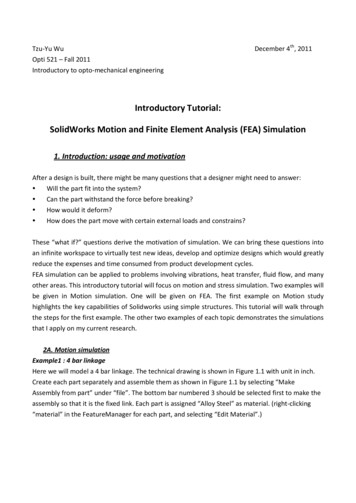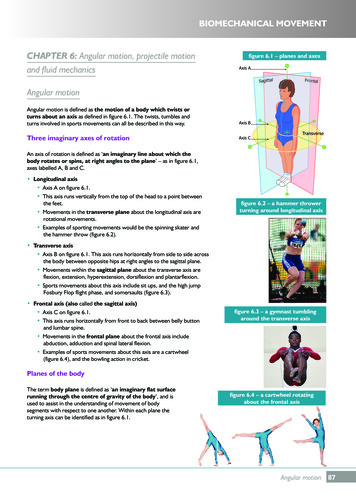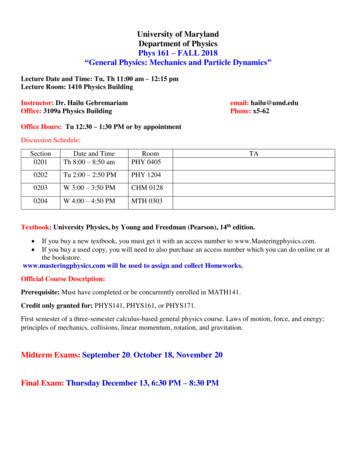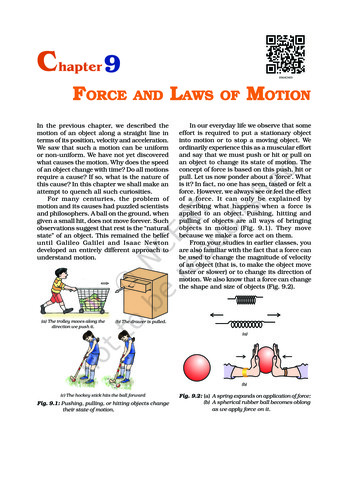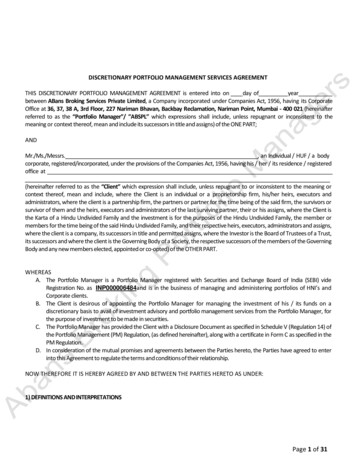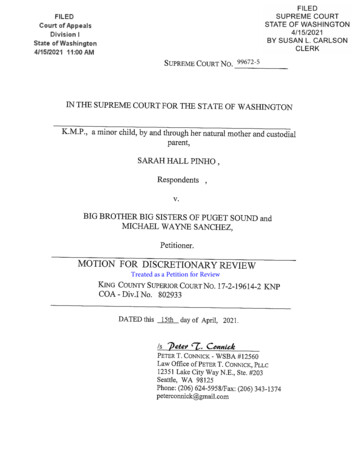
Transcription
FILEDCourt of AppealsDivision IState of WashingtonSUPREME COURT No. 99672-54115/2021 11:00 AM-----INTHESUPREJ\1ECOURTFOR THE STATE OF WASHINGTONK.M.P., a minor child, by and through her natural mother and custodialparent,SARAH HALL PINHO ,Respondents ,V.BIG BROTHER BIG SISTERS OF PUGET SOUND andMICHAEL WAYNE SANCHEZ,Petitioner.MOTION FOR DISCRETIONARY REVIEWTreated as a Petition for ReviewKING COUNTY SUPERIOR COURT No. 17-2-19614-2 KNPCOA - Div.I No. 802933DATED this15th day of April, 2021.Is ])ete 'q,Ccnni&kPETER T. CONNICK -WSBA #12560Law Office of PETER T. CONNICK, PLLC12351 Lake City Way N.E., Ste. #203Seattle, WA 98125Phone: (206) 624-5958/Fax: (206) 343-1374peterconnick@gmail.com
TABLE OF CONTENTSI.IDENTITY OF PETITIONER AND DECISION BELOW1II.ISSUES PRESENTED FOR REVIEW1III. STATEMENT OF THE CASE3IV.ARGUMENT6(1) The trial and appeals decisions conflict with Supreme Court holdingswhich necessitates this court's review.A. Leishman caseB. Conflicts with Richmond v. Thompson, and Supreme Courtapproved Jury Instructions.C. Conflict with Davis vs. Cox.61516(2) Conflicts with other published Court of Appeals decisions.17(3) The decisions appealed raise a significant question of lawunder the Federal And State Constitutions.17A. Denial of right to trial.B. The court denied the right to present evidence.C. Denial of the right to counsel in a civil case.D. Right to litigate defense.E. Sanchez's right to be present.(4) The decision involves substantial issues of public interest that onlythis court can determine.V.6171818191920CONCLUSION20VI. APPENDICES
TABLE OF AUTHORITIESWashington CasesBerry v. Howe, 39 Wn.2d 235,235 P.2d 170 (1951)Brown v. Derry, 10 Wn. App. 459, 518 P.2d 251 (1974)Davis v. Cox, 183 Wn.2d 269,351 P.3d 862 (2015)Doe v. Gonzaga, 143 Wn.2d 687, 24 P.3d 390 (2001)Garrattv. Dailey, 46 Wn.2d 197,279 P.2d 1091 (1955)Graving v. Dorn, 63 Wn.2d 236,386 P.2d 621 (1963)In re Wixom, 182 Wn. App. 881,332 P.3d 1063 (2014)Johnson v. Ryan, 186 Wn. App. 562, 346 P.3d 789 (2015)Leishman v. Ogden Murphy Wallace, 196 Wn.2d 898, 479P.3d 688 (2021)Richmond v. Thompson, 130 Wn.2d 368, 922 P.2d 1343(1996)Right-Price Recreation, LLC v. Connells Prairie CommunityCouncil, 146 Wn.2d 370,384, 46 P.3d 789 (2002)Robinson v. Lindsay, 92 Wn.2d 410, 598 P.2d 392 (1979)Segaline v. Dep 't ofLabor & Indus., 169 Wn.2d 467, 23 8P.3d 1107 (2010)Valdez-Zontek v. Eastmont Sch. Dist., 154 Wn. App. 147,225 P.3d 339 (2010)Wilson v. State, 84 Wn. App. 332, 929 P.2d 448 (1996)].13131, 16, 17161414181, 181, 6,7,8,10,11,12,15,181, 15, 161113111518Washington StatutesRCW 4.24.510RCW 4.24.525RCW 71.09.0201,2,5,6, 8, 9, 10164i.
Washington RulesCR 12(b)(6)CR35CR41CR56RAP 2.3RAP 13.4544, 5141, 21RPC 1.719United States Supreme Court CasesBounds v. Smith, 430 U.S. 817, 97 S. Ct. 1491, 52 L. Ed.2d 72 (1977)Douglas v. California, 372 U.S. 353, 83 S. Ct. 814, 9 L.Ed. 2d 811 (1963)Lewis v. Casey, 518 U.S. 343,116 S. Ct. 2174, 135 L. Ed.2d 606 (1996)Whitney v. Buckner, 107 Wn.2d 861, 734 P.2d 485 (1987)Wolff v. McDonnell, 418 U.S. 539, 94 S. Ct. 2963, 41 L.Ed. 2d 935 (1974).1919191919Miscellaneous CasesChastain v. Hodgdon, 202 F.Supp.3d 1216 (D. Kan.2016)Ratner v. Kohler, No. 17-00542 HG-KSC, 2018 U.S. Dist.Lexis 30761 (D. Haw. 02/26/18)11.1616
I. IDENTITY OF PETITIONER AND DECISION BELOWMichael Sanchez, appellant/petitioner, seeks review of the2/22/21 Court of Appeals Division decision( s), denial ofreconsideration on 3/16/21 which affirmed these trial court orders:(a) 5/15/19 orders of denying Sanchez's motion to continue the trialdate, and for withdrawal/substitution. (b) 6/21/19 orders grantingsummary judgment; 7/23/19 and denying reconsideration. (c)9/18/21 order for RCW 4.25.510 sanctions against Sanchez. (d)Court of Appeals exclusion of parts of the trial court record.(Objection filed 12/20/20). Copies attached per (RAP 13.4 (c) (9)).II. ISSUES PRESENTED FOR REVIEW:This court should accept review because: RAP 2.3(1)&(2). The decision conflicts with Supreme Court andCourt of Appeals decisions below and review is warranted:(a)(b)(c)(d)Richmond v. Thompson, 130 Wn. d 368 (1996).Leishman v. 0.M W, 196 Wn.2d 898 (2021).Davis v. Cox, 180 Wn. App. 514 (2014)Johnson v. Ryan, 186 Wn. App. 562 (2015) RAP 2.3(3). The decision raises significant constitutionalquestions.(a) Due Process rights listed in Part IV, i.e. right to Counsel, right to1
be heard (and read), and right to be present and present evidence.(b) Whether the right to defend against lawsuits is a constructivewaiver of SLAPP immunity from defensive counterclaims from thesame transaction. See (4)( d) below. RAP 2.3(4). The decision involves the following substantialissues of public interest that only this court can determine:(a) In expanding and misapplying Leishman 's holding that"person" can mean "persons" within an organization (who canshare SLAPP immunity), to any loosely associated group, causessuch uncertainty, that it denies access to justice for those who can'tafford to risk SLAPP sanctions, in this case, 40,000 for anindigent to litigate a narrow RCW 4.24.510 motion.(b) Like tenpins in a bowling alley, it unhinged this court's balanceof access to justice vs. rights to access government.(c) It eviscerated protections against the malicious defamation ofan attention-seeking minor, as if the minor were talking with lawenforcement, not a mentor who the trial court had already ruled hasno duty to KMP - a minor who resisted talking to police.2
III. STATEMENT OF THE CASESanchez's submitted deposition, photos, and police reportssupport the facts below. On 4/29/16, KMP approached Sanchez ona pier, complaining she never caught a fish. Sanchez handed her hispole, holding the top so the fish wouldn't pull it into the water. Tokeep KMP from sliding into the lake, Sanchez held the end ofKMP's long coattail while she lay face down washing her hands.Thirty (30) minutes later, Sanchez learned ofKMP's delayedaccusation that KMP told Darla Tishman. Ms. Tishman called 911.Sanchez ran to the pier to talk to police and gather witnesseswatching close by, which demonstrated his confidence thatwitnesses would confirm his innocence. KMP's conduct alsoimplied Sanchez's innocence - i.e., KMP resisted talking to policebecause she "knew" nobody saw any molestation and Sanchezwould deny it. KMP knew witnesses surrounded them, whichsupported the inference that KMP "knew" nobody saw anyimproper touching because it didn't happen. Another inference:Sanchez knew the crowd would stop him ifhe tried. Neither court3
considered these inferences. Chang never raised them, consistentwith his conflict of interest.Sanchez made his Alford plea to reduce his risk from life inprison to 16 months, but got life anyway when the State filed itsSVP petition against Sanchez alleging the unproven KJvlPallegation as its jurisdictional predicate offense. KJvlP then filed aprivate civil suit against Sanchez, naming BBBS and mentor DarlaTishman as codefendant for negligent supervision. KJvlP filedpsychologist records to show KJvlP was disturbed, alleging BBB S'snegligent-selection of mentor Tishman, who lacked clinicalexpertise. But the court dismissed defendant Tishman because shehad no duty to "protect" KJvlP, and ordered a CR 35 psychiatricevaluation ofKJvlP. Sanchez's DPD Attorney, Edward Klein, fileda NOA on Sanchez's behalf seeking the evaluator's records. Inresponse, KJvlP filed a CR 41 motion to dismiss Sanchez withoutprejudice. Sanchez was faced with CR 41 dismissal that woulddelay his chance to prove innocence to convince the SVPprosecutor to dismiss, knowing they could not prove the KJvlP4
incident (Alford plea) to an SVP jury. So with counsel's advice,Sanchez filed his CR 41 objection to dismissal with hls defamationcounterclaim. The trial court denied KMP' s CR 41 motion,accepting Sanchez's counterclaim. Private counsel Ken Changreplaced Attorney Klein pro bona. All ofKMP's 12(b)(6) motionsagainst the counterclaim failed. Chang neglected the case for 10months as scheduling order deadlines expired. As the trial dateapproached, Chang admitted hls malpractice in hls motions towithdraw and continue, since, objectively Chang faced disciplineand malpractice liability. KMP offered a suggestion: The courtcould find that 4.24.510 immunity invalidated the counterclaim asworthless whlch would moot Chang's neglect. Chang needed tolose summary judgment. So Chang moved to withdraw to substitutean attorney who could evaluate KMP' s SLAPP defense without theconfirmation bias that confronted Chang. Chang submitted twodeclarations in hls motion to continue and withdraw, whicharticulated the conflict. The trial court denied Chang's motionswithout hearing or comment. Summary judgment proceeded. The5
court found no prima facie case on falsity, malice, or damages andfound SLAPP immunity. This rendered as res judicata the RCW4.24.510 defense of bad faith because the court had pre-judgedfacts on whether SLAPP applied, and the bad faith defense prior tothe SLAPP hearing. Nothing in the record supports Chang havingexplained the gravity of the hearing to Sanchez or allowed hisoption to appear by phone which is routine from McNeil Island.The Court Records showed Chang having timely filed Sanchez'sdeposition with highlighted details explained above, but nothing onthe record shows the court's acknowledgement of them. Thisenabled KMP to successfully argue that bare denial of allegations isinsufficient to establish the falsity element.IV. ARGUMENT1.The trial and appeals decision conflicts with Supreme Courtholdings which necessitates this court's review.A. Leishman case: Division One's decision has changed the legallandscape by its reliance on Leishman 's definition of "person" farbeyond its scope, thus requiring parties to guess whether their claim6
will succeed or fail with heavy sanctions. The appellate holdingthus increased the risk premium on any First Amendment right torecover damages beyond what Leishman intended. Leishman wasdecided just before the court's decision. (Leischman opinion01/28/21; KMP v. Sanchez's reply brief04/03/20; opinion03/19/21). This left no chance for parties to learn the legal theorythe court would select: whether the term "person" means "people",which could be any group of persons sharing communal immunity.Sanchez's counterclaim was straight-forward. There was no factualor legal basis for Tishman to share her SLAPP immunity withKMP. Tishman was a chaperone on a social outing, not an "agent"of an organization that included KMP. In applying Leishman, theappeals court reclassified Tishman and KMP as one, composite"person". But Leishman does not make multiple persons into oneperson without other factors. They were not a corporation,government contractor, or homeowner's lobbying group. Each ofthese groups functioned to provide information to government. Incontrast, the KMP court dismissed Tishman as a party because7
Tishrnan was a private person with no duty to KMP. To declinereview would muddle Leishman 's criteria for designating anygroup of"persons" into one "person" to share immunity. Leishmaninterpreted "person" to "also be read as people - "RCW 4.24.510tolerates some degree of over-inclusiveness: in order for theimmunity to protect against the burden oflitigation that woulddeter people from reporting information to the government, anyperson who communicates information reasonably of concern tothe government must be immune to suit based on thecommunication." Leishman 196 Wn.2d at 899,908.This would allow any court to deem any group as one"person" and sharing in each other's RCW 4.24.510 immunity bycobbling together some theory that unites them into one "person"such as a qualified common interest privilege, child abuse reportingstatutes, etc. Then just apply Leishman to allow all courts to deemany group of people to be one private person with communalSLAPP immunity, thereby extending Leishman 's "person" beyondits holding and the decisional history it cites, namely, corporations8
or businesses delegated to communicate with law enforcement. ButKMP's communication to Tishman and Pinho, and Tishman's latercall to 911 were separate and distinct communications - Tishman'scall to seek government services and KMP to seek childish attention.Tishman had absolute immunity because she sought police services.But Leishman does not make KMP and Tishman a single personwith shared immunity. Even if Leishman had meant for Division Ito apply it as it did, this case still merits review to explain whetherLeishman meant that any amorphous group can share SLAPPimmunity such as a minor and her social mentor, or based on childabuse reporting qualified immunity, so any court can bootstrapsabsolute SLAPP immunity onto the qualified immunity of"commoninterest" or other privilege. In Leishman, the AGO (a governmentagency) hired the OWM law firm to investigate employeemisconduct. Termination resulted. The employee sued the law firmand its government-contracted investigator, alleging theirinvestigator's defamatory statements were not SLAPP-protectedbecause they were not directed to government. This Court rejected9
that argument because the government (AGO's) contract madeOWM into the government's investigative organ so the firm couldbe a single person under the definition of "person", reasoning theyare like agents of each other and are thus one "person". But thisresult rested on two legal constructs: (1) the government contractmade the investigating agency (OMW) an arm of the government,(AGO); and (2) any individual person who made defamatorystatements to and within the scope of the investigating firm'sfunction to provide law enforcement with information, thus sharingimputed SLAPP immunity among firm members. The concurringopinion mentioned the agency theory. This court clarified thelegislative intent of the SLAPP definition of"person", to mean it"can include" a singular organization with multiple "person(s)" withshared immunity regardless of which spokesman reports to lawenforcement. This court's examples allowed shared SLAPPimmunity in the limited circumstances: i.e., organizations whichfunction to give information to government. In expanding Leishman,Division I reasoned that KMP and Tishman are like the OMW, the10
AGO firm contracting with government to investigate theemployee's misconduct. Or, that K1v1P's mentor Tishman, was likepart of the lobbying group in Right-Price Recreation, LLC v.Connells Prairie Community Council, 146 Wn.2d 370,384 (2002)(groups were entitled in Prairie Council to statutory immunity on adeveloper's claim for defamation, as the developer failed to establishthat the groups' statements at public meetings were made with actualmalice.)However, the Supreme Court has held that governmentagencies are not "persons" under the statute. Segaline v. Dep 't ofLabor & Indus., 169 Wn.2d 467,470 (2010) (plurality opinion). Inboth cases of Prairie Council and Segaline, the organizations wereconceptually one "person" and therefore shared SLAPP immunityfor direct communications to government, even if thecommunications were through a spokesman. But here, the court,without any notice to the litigants, applied Leishman beyond itsfacts to coalesce two persons, neither of whom was de facto or bylaw a "spokesman" for the other. This also denied Sanchez's right11
to present the facts that distinguish Sanchez from Leishman, letalone to have them adjudicated by a jury or fact finder, as this courtrequired in Davis, supra. Such facts include that neither KMP norTishman had a contract or function to give law enforcementinformation, nor were they "agents" of each other, nor can Tishmanbe considered "in loco parentis" when the trial court dismissed heras KMP's defendant precisely because she had no suchresponsibilities for KMP who resisted talking to police.Every child abuse reporting statute gives immunity to allreporters but they already limit child abuse reporting immunity togood faith (which malice overcomes). These are fact issues that thecourts denied Sanchez and his right to adjudicate. If this decisionstands, fewer lawyers would dare take cases with this uncertaintyabout Leishman 's scope, when it's uncertain whether a mentorprogram, religious sect, or book club, shares each other's SLAPPimmunity as one "person". Would the Three Musketeers shareimmunity as one person being "All for one and one for all"? Thecourt's holding that it is absurd not to find that people relaying12
child abuse had communal SLAPP immunity, it is not at all absurd.A less-hyperbolic summary of the law the appellate decisiongeneralizes is this: For any minor who knowingly communicatesmalicious defamation to private persons, and where tort law holdssuch minor at the age of capacity to know the wrongfulness of hertort, then yes, she will have to call the police him/herself to getSLAPP immunity beyond the qualified immunity already afforded.Robinson v. Lindsay, 92 Wn.2d 410, 413 (1979) (holding that whenactivity a child engages in is inherently dangerous, like operatingdangerous machinery, the child should be held to an adult standardof care); Beny v. Howe, 39 Wn.2d 235,238 (1951) (affirming thetrial court's finding that an 11-year-old caddy was guilty ofcontributory negligence for failing to protect himself from being hitin the eye by a golf ball); Brown v. Derry, 10 Wn. App. 459,464(1974) (affirming the trial court's holding that a 16-year-old wasguilty of contributory negligence for injuries he sustained fromriding on the trunk of a moving car while wearing a wetsuit).These child tort liability cases do not produce the image of13
helpless children who must dial 911 themselves for relief fromchild abuse. Tort law already defines the classes of children exemptfrom defamation liability so small children don't call the policethemselves to enjoy absolute immunity from malicious defamation.In Garrattv. Dailey, 46 Wn.2d 197, 79 P.2d 1091 (1955), theSupreme Court observed that children under 6 may be held liablefor volitional, wrongful conduct. Exceptions are trial issues, not CR56 issues. 1Child abuse immunity protects children, SLAPP protectsagainst litigation. When kids play with matches, the law allowsrecovery. It is far from "absurd" to limit absolute SLAPP immunityto communications direct to law enforcement. Unlikecommunications to those from whom a minor seeks attention,statements to law enforcement function to access government. The1E.g., see Graving v. Dorn, 63 Wn.2d 236237, 386 P.2d 621(1963): "In cases involving children of from seven to fourteenyears, that the question of the capacity of such child was aquestion of fact. .since the presumpt ion of incapabil ity did notattach at such ages.14
qualified common interest privilege defines the limits of immunityto defamatory statements to family members. 2 No statutoryconstruction allows the appeals court to infer SLAPP's absoluteimmunity to protect children when the very statutes the appealscourt cites provide only qualified immunity. Leishman recognizedthis delicate balance. In the SLAPP statutes' amendments there isabsolute immunity for all statements to government (not privatepersons) because even people with good faith could be burdenedwith litigation challenging said good faith. But the appeals court'svague, amalgamation of groups of people into one "person" sharingSLAPP immunity necessitates this court's review.B. Conflicts with Richmond v. Thompson (supra), andSupreme Court approved Jury Instructions.The trial court's dismissal also contradicts the SupremeCourt's decision in Richmond v. Thomson (supra). The Supreme2E.g., Valdez-Zontek v. Eastmont Sch. Dist., 154 Wn. App. 147,5 P.3d 339 (2010) - this privilege generally applies toorganizations, partnersh ips and associations, and arises whenparties need to speak freely and openly about subjectsof common organizat ional or pecuniary interest.15
Court's approval of the jury instruction that defines "malice" inthe disjunctive, where knowledge of falsity alone establishedprima facie evidence for clear and convincing evidence of malice.Doe v. Gonzaga, 143 Wn.2d 687 (2001). "In Richmond, this courtnoted that personal knowledge of assault allegations, if true, issufficient for malice if false. See also Ratner v. Kohler, No. 1700542 HG-KSC, 2018 U.S. Dist. LEXIS 30761 (D. Haw. 02/26/18);see also Chastain v. Hodgdon, 202 F.Supp.3d 1216, 1221-22 (D.Kan. 2016), (sexual assault cases). When court failed to inferknowledge of falsity, it mooted the bad faith .510 defense.C. Conflict with Davis vs. Cox: "In Davis this Supreme Courtdeemed the subtle differences in attorney fees provided in the RCW4.24.525 fee assessment procedures that tipped the balance betweenlitigation-deterrence over the right to litigate too far. The decisionappealed in this case, hammered the delicate balancing scaledefined in Davis v. Cox:Whatever the precise contours of the line,RCW4.24.525(6)adoubtlessly falls on the impermissible side that punishes theexercise of the right to petition. fu addition to attorney fees and16
cost shifting, the statute assesses a statutory penalty of 10,000(potentially to each movant, as in this case below, where 160,000 was awarded in total to the 16 movants) and "[s]uchadditional relief. . as the court determines to be necessary todeter repetition of the conduct and comparable conduct byothers similarly situated."RCW 4.24.525(6)(a)(iii). This is harshpunishment for bringing what may be a nonfrivolous claim,albeit one that cannot show by clear and convincing evidence aprobability of succeeding at trial.Davis v. Cox, 183 Wn.2d 69, 96, ftnte. 12.The trial and appeals court assessed those fees anyway.(2) Conflicts with other published Court of Appeals decisionsas approved in Leishman and herein.(3) The decisions raise a significant questions of lawunder the Federal or State Constitutions.A. Denial of right to trial. The court denied Mr. Sanchez's stateand federal rights to a jury trial. Seventh Amend., U.S. CONST. andWASH CONST., art. 1, § 1, (Davis, 183 Wn.2d 69, 96, note 7).When the trial court substituted its evaluation of the evidence inthis case for a jury's, it was error including the court's failure toconsider reasonable inferences in a light most favorable to Mr.Sanchez. Instead, the court determined credibility by disregardingSanchez's detailed denials. KMP urged the court to consider the17
officers' opinions of guilt. The court denied Sanchez his right topresent facts Leishman found relevant. See also Johnson v. Ryan,186 Wn. App. 562 (2015) citing Wilson v. State, 84 Wn. App. 332,342 (1996).B. The court denied the right to present evidence. The rulingswere unresponsive to the evidence submitted. (see appendices).C. Denial of the right to counsel in a civil case. The Court ofAppeals affirmed the court's denial (without comment) of counsel'swithdrawal and continuance motions. The court held that with aconflict between counsel and client on apportioning sanctionsbetween them, there is no conflict when not ripe. But that was notthe conflict. In applying In re Wixom, 182 Wn.2d 1938 (1994), theappeals court ruled on a different conflict than what Changproffered in its affidavits: The lawyer's compelling interest (inlosing his client's summary judgment hearing) disqualified him.The record did not support that the court considered the conflict, letalone whether it necessitated withdrawal. Any ruling is an abuse ofdiscretion when nothing in the record supports it. Once the court18
denied Chang's withdrawal for substitution pursuant to RPC 1.7(c),the court became responsible for denying Sanchez representation.See Bounds v. Smith, 430 U.S. 817 (1977). 3D. Right to litigate offset counterclaims. Immunity is a shield:not a sword. This court should consider whether the right to defendagainst civil claims creates a constructive waiver of the SLAPPdefense against the original claim from the same transaction (theassault that the plaintiff falsely filed a private lawsuit for).E. Right to be present. The court denied Sanchez his right to bepresent when his lawyer never told Jvfr. Sanchez about the hearing'scommencement to allow telephonic presence. The court used facts' Prisoners have a constitutional right of access to thecourts. Bounds v. Smith, 430 U.S. 817, 821, 97 S. Ct. 1491, 52L. Ed. 2d 72 (1977), abrogated on other grounds by Lewis v.Casey, 518 U.S. 343, 116 S. Ct. 2174, 135 L. Ed. 2d 606(1996). This right includes access to civil proceedings. Whitneyv. Buckner, 107 Wn.2d 861, 865, 734 P.2d 485(1987) (citing Woljf v. McDonnell, 418 U.S. 539, 578-79, 94 S.Ct. 2963, 41 L. Ed. 2d 935 (1974)). Prisons must also providebasic supplies to the extent necessary to ensure that a prisoner'saccess to the court is meaningful. The Supreme Court hasfurther rule that a prisoner must be provide d legal counsel if itmeans he will receive a "meaningful appeal." Douglas v.California, 372 U.S. 353 (1963).19
unsupported in the record that Sanchez knew about the scheduledhearing and chose not to appear. at a hearing that cost him over 40,000 that was in his attorney's existential interest to lose.4. The decision involves the following substantial issues ofpublic interest that only this court can determine.(a) Expanding Leishman beyond this court's intent reducesattorneys to a blackjack dealer's function to explain the rules,risking public anxiety and resentment. (b) It disturbs the balancebetween the right to access government services vs. the right to tortrecovery. ( c) Public interest is tied to its fear of whether a child canspread false allegations with total immunity if the police are latercalled by anyone. (d) Whether lawyers serve their profession whentheir work is not reviewed is of interest to lawyers and the public.The gaps in the court's response to submissions concern anyoneseeking justice when the tribunal is unresponsive.V. CONC LUSIO N: For the aforesaid reasons, petitionerrequests review of the decisions in the attached appendices.20
VI. APPENDICESKMP v. Sanchez1.2.3.4.5.6.7.8.9.10.COA 02/22/21 DecisionCOADenial ofReconsideration on 03/16/21Superior Court Order 06/06/19 Denying Sanchez's Motion to Continuethe Trial Date & Withdrawal/Substitution.Superior Court order 06/21/19 granting summary judgmentSuperior Court 07/23/19 Order denying reconsiderationSuperior Court 10/15/19 Order for RCW 4.25.510 sanctions against Sanchez.05/20/19 Chang Declaration06/03/19 Henrikson Declaration02/14/20 Order regarding Appellant's Motion and Declaration to AllowAppendices02/06/20 Motion and Declaration to Allow Appendices to Appellant'sOpening Brief
APPENDICE 1
FILED2/22/2021Court of AppealsDivision IState of WashingtonIN THE COURT OF APPEALS OF THE STATE OF WASHINGTONDIVISION ONEK.M.P., a minor child, by and through)her natural mother and custodial parent, )SARAH HALL PINHO, an individual,)No. 80293-3-1)Respondents,V.))))BIG BROTHER BIG SISTERSOF PUGET SOUND and MICHAELWAYNE SANCHEZ,Appellant.VERELLEN,)))PUBLISHED OPINION))J. - When a minor child tells their caregiver that they have beenabused and the caregiver relays that information to police, both the child and thecaregiver are "persons" communicating information to police entitled to immunityunder the anti-SLAPP statute, RCW 4.24.510. 1The alleged abuser's argument that the child's statement to her caregiver isnot covered by the anti-SLAPP statute fails. To require a minor child to call 911herself to acquire immunity would be an absurd result. The child is entitled toimmunity against the abuser's defamation claim based upon her comments to hercaregiver.1The acronym SLAPP stands for strategic lawsuit against publicparticipation.
No. 80293-3-1/2The trial court did not abuse its discretion in issuing CR 11 sanctionsagainst the defendant's attorney or denying the attorney's motion to withdraw.As the prevailing party on appeal, the child is entitled to attorney fees underRCW 4.24.510.Therefore, we affirm.FACTSOn April 29, 2016, nine-year-old KMP joined her "big sister'' from BigBrothers Big Sisters of Puget Sound (BBBS) for a trip to a local lake. 2 KMP andher "big sister'' walked to the dock where people were fishing. Michael Sanchez,one of the fisherman, caught a fish and asked KMP if she wanted to reel it in.KMP agreed, and Sanchez "positioned [her] right in front" of him "so he was rightbehind her" holding on to the pole. Soon after, KMP knelt down beside the lake torinse her hands, and Sanchez "held on to her jacket." 3 Later, Sanchezapproached KMP again so he could tie a longer string to her fish.About 15 minutes later, KMP told her "big sister" that Sanchez had"inappropriately touched" her on her "privates." 4 Moments later, her "big sister"received a phone call from Sarah Pinho, KMP's mother. Her "big sister" told Pin ho2"Big Brothers Big Sisters of Puget Sound is a youth-serving nonprofit inWashington [s]tate. Its mission is to provide children facing adversity with strongand enduring, professionally supported one-on-one relationships that change theirlives for the better. Big Brothers Big Sisters of Puget Sound makes monitoredmatches between adult volunteers ("Bigs") and children ("Littles"), ages 6 through18." Appellant's Br. at 5.3Clerk's Papers (CP) at 808.4CP at 183.2
No. 80293-3-1/3what happened and then called the police after Pin ho urged her to. Withinminutes, the police arrived and KMP told them Sanchez touched herinappropriately.On July 25, 2017, KMP sued her "big sister" and BBBS for negligence andsued Sanchez for sexual battery. The trial court dismissed her "big sister," andBBBS settled with KMP. Sanchez entered an Alford 5 plea to the charge ofattempted second degree child molestation. As a result of Sanchez's guilty plea,KMP moved to dismiss her sexual battery claim against Sanchez. Sanchezobjected and filed various counterclaims against KMP. 6When Sanchez filed his counterclaims, he was also a respondent in ase
PETER T. CONNICK -WSBA #12560 . Seattle, WA 98125 Phone: (206) 624-5958/Fax: (206) 343-1374 peterconnick@gmail.com 99672-5 Treated as a Petition for Review. TABLE OF CONTENTS I. IDENTITY OF PETITIONER AND DECISION BELOW 1 . Sanchez's DPD Attorney, Edward Klein, filed
